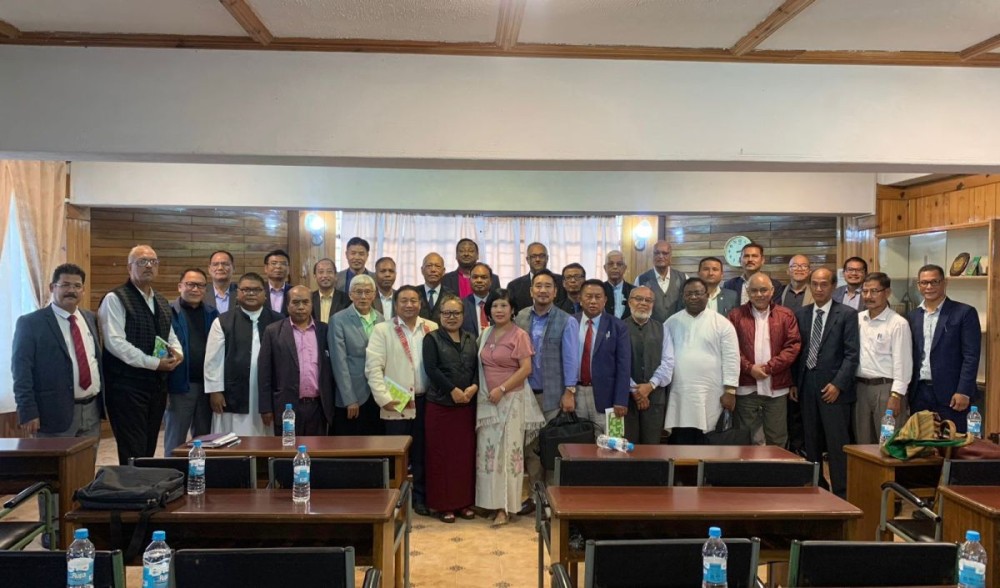
Meyu Changkiri
The humanitarian situation in Manipur has entered its third year, and its impact continues to be deeply felt across our region. Families have been displaced from homes built over generations. Churches and community spaces that once shaped shared identity now stand damaged or deserted. Children are growing up in temporary shelters, uncertain of when they will return to familiar classrooms and playgrounds. This has been a time of difficulty and disruption for many.
Yet alongside this hardship, another story quietly continues to unfold. Communities are supporting one another. Help is being extended without publicity. Cooperation is emerging across traditions and regions. These steady acts of care reflect resilience, shared responsibility, and hope.
Recently, I participated in the Annual General Meeting of the United Christian Forum of North East India (UCFNEI), held at the Presbyterian Church of India headquarters in Shillong. Representatives from Protestant and Roman Catholic churches across the Northeast were present. The discussions did not revolve around institutional boundaries, but around how we may respond together in meaningful and responsible ways.
The situation in Manipur is not distant, and it is not “someone else’s problem.” The Northeast is a woven fabric of relationships - families, friendships, shared roads, shared cultures, shared hopes. When one thread is pulled, the whole fabric is affected. What is happening in Manipur touches all of us, because we are connected not only by geography, but by the life we share in this region. To acknowledge this is to begin responding with the heart of a neighbor.
Earlier, from February 27–29, 2024, when the North East India Christian Council sent a three-member goodwill team to Manipur, I had the opportunity to visit the affected people in the relief camps myself. The team consisted of Bishop Ichahak Muchahary of the Bodo Evangelical Lutheran Church, Rev. Dr. B. J. Syiemlieh of the Khasi Jaintia Presbyterian Synod, and myself. The visit was hosted by the Manipur Baptist Convention, and we are grateful for their hospitality and leadership. Rev. Losu Mao, the General Secretary of the Convention, graciously arranged our stay and coordinated our meetings and visitations to the affected communities.
We also had the opportunity to meet and share with Archbishop Dr. Linus Neli of the Roman Catholic Archdiocese of Imphal. The time spent with him affirmed a shared commitment to peace, healing, and solidarity. His insights, along with the coordinated efforts of churches on the ground, reflected a deep spirit of cooperation rooted in faith and responsibility.
In the midst of hardship, what stood out most was the unity of the churches. Regardless of affiliation or tradition, they worked together to support the displaced. It was ecumenism in action - quiet, sincere, and practical. Volunteers shared responsibilities, coordinated resources, and encouraged one another. The cooperation visible there demonstrated that unity is not an aspiration - it is already being lived.
At the UCFNEI meeting, this shared sense of responsibility guided the decisions. The forum also appealed to the Central Government to strengthen rehabilitation efforts, especially as winter intensifies the challenges of camp life. Access to adequate housing, healthcare, nutrition, education, and the protection of homes and places of worship remains essential.
The Church’s involvement in this work is natural. Churches across the Northeast are closely integrated into the life of communities. They provide education, healthcare, counseling, and social support. Volunteers continue to serve quietly and consistently because care for one another is part of our shared life. These steady efforts show that unity is not distant. It is present, visible, and growing.
During a panel discussion at the meeting, a meaningful reminder emerged: unity does not require uniformity. The Northeast is a region of rich cultural diversity. Our languages, traditions, and worship practices differ; yet these differences do not prevent cooperation. They enrich it. Identity is not diminished by working together - it is strengthened when it contributes to shared well-being.
Unity is shaped in daily life - how we speak, how we listen, how we respond. A compassionate society grows from such choices. The Northeast has a long history of resilience. Communities here have faced challenges before and have rebuilt relationships many times. That capacity remains strong. Our cultural values of respect, hospitality, and thoughtful dialogue continue to guide us.
The path to healing in Manipur will take time. Rebuilding homes and restoring livelihoods requires patience and cooperation. Supporting those who have experienced displacement requires sensitivity and understanding. Yet we are not without the resources we need. We have strong community networks, active faith institutions, and a shared desire for peace grounded in dignity and mutual responsibility.
We should not hesitate in supporting unity initiatives. Today the suffering may be in one place; tomorrow, it may be closer to home. But more importantly, unity is central to our calling. The people of God are called to live in unity - not as sameness, but as shared life shaped by compassion, responsibility, and respect.
We remain one people not because we think alike or worship alike, but because our well-being is interconnected. When we act with steadiness, empathy, and responsibility, unity becomes visible. It becomes practical. It becomes the way forward.



